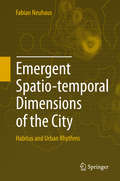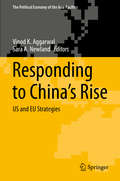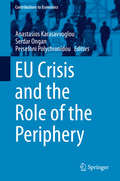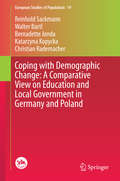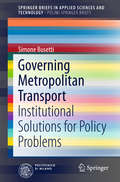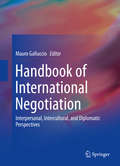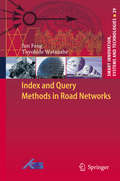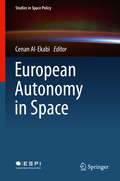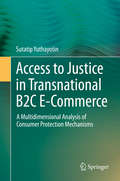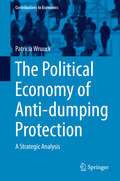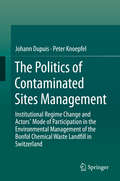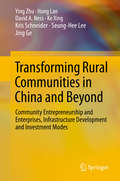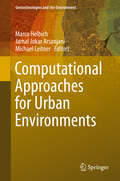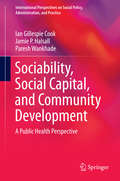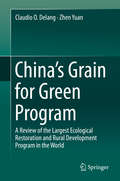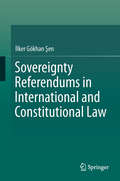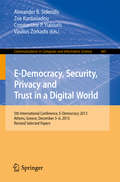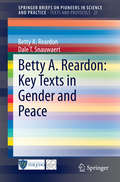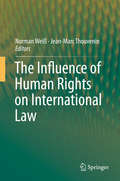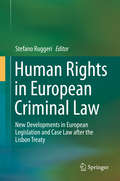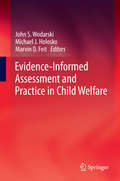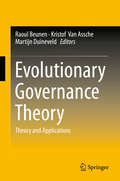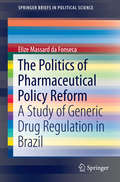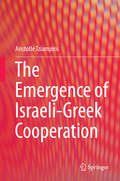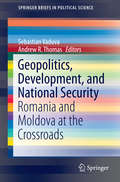- Table View
- List View
Emergent Spatio-temporal Dimensions of the City
by Fabian NeuhausThis book focuses on the creation of space as an activity. The argument draws not only on aspects of movement in time, but also on a cultural and specifically social context influencing the creation of the spatial habitus. The book reconsiders existing theories of time and space in the field of urban planning and develops an updated account of spatial activity, experience and space-making. Recent developments in spatial practice, specifically related to new technologies, make this an important and timely task. Integrating spatial-temporal dynamics into the way we think about cities aids the implementation of sustainable forms of urban planning. The study is composed of two different case studies. One case is based on fieldwork tracking individual movement using GPS, the other case utilises data mined from Twitter. One of the key elements in the conclusion to this book is the definition of temporality as a status rather than a transition. It is argued that through repetitive practices as habitus, time has presence and agency in our everyday lives. This book is based on the work undertaken for a PhD at the Centre for Advanced Spatial Analysis and was and accepted as thesis by University College London in 2013.
Responding to China's Rise
by Vinod K. Aggarwal Sara A. NewlandIn this edited volume, a set of issue and country experts tackle questions regarding China's current rise to power within the current international economic and political order. The current international system is governed by a "Western" conception of order and based on the primacy of post-World War II rules, drawn from liberal models of capitalism and democracy practiced in the US and in Western Europe. In this context, the most important and most uncertain questions facing the West over the next decade concern how the EU and the US will respond to China's rapid growth. Will the transatlantic relationship hold and become stronger, faced with this new economic and geopolitical challenge? Or will the US and the EU--an increasingly prominent global player--compete for economic and political advantage? After a brief introduction laying out the circumstances of China's economic and political rise and the challenges that this poses to the existing international order, the book proceeds in three sections. The first section provides competing theoretical perspectives on China's rise in a historical context. The second section provides a distinctly Chinese perspective on China's current rise. The third section looks at responses from the United States and the European Union, focusing on both economic and security issues as well as the implications of China's rise for US-EU relations. This book is relevant to both scholars and policymakers concerned with Chinese domestic politics and foreign policy, US foreign policy, EU foreign policy, China-US relations, China-EU relations, international security, international political economy and emerging markets.
EU Crisis and the Role of the Periphery
by Anastasios Karasavvoglou Persefoni Polychronidou Serdar OnganThe European economy is still in recession, even though there are some weak indications of stabilization. This book examines important aspects of the crisis in selected countries of Southern Europe, the Balkans and Eastern Europe. The intensity of the crisis and its economic and social repercussions have varied from country to country, generally impacting the core countries less than those on the periphery. The countries in the latter group currently face significant structural challenges with regard to improving productivity and competitiveness, including the areas of investment, climate, the labour market, and the public sector. The book not only illustrates the scope of the problem, but also informs readers on the policies implemented to address it, and discusses the progress some of the economies have already made. Special topics include the convergence hypothesis, agriculture and growth, Public-Private Partnership in Infrastructure (PPPI), and the labour market.
Coping with Demographic Change: A Comparative View On Education And Local Government In Germany And Poland (European Studies of Population #19)
by Reinhold Sackmann Walter Bartl Bernadette Jonda Katarzyna Kopycka Christian RademacherWith many OECD countries experiencing a decline in their populations, this book offers a theoretical model of coping with demographic change and examines different strategies that societies have used to come to terms with demographic change. In particular, it details the different ways that Germany and Poland have tried to cope with this challenge and reveals three conflicting strategies: expansion, reduction, and phasing out. Coverage includes: · How and why demographic change was used in Poland to expand the education system · The variance of linkage between demographic change and growth rates in different fields of education in a German Bundesland · Modes of reflexivity and personnel policy in German and Polish municipalities · Effects of demographic change and forms of coping on fiscal capacity and unemployment rates in German municipalities Coping with Demographic Change examines how and why societies cope with these detrimental effects. It conceptualizes the challenges a society faces as a result of demographic change and focuses on the processes by which actors, organizations and nation-states try to cope with this new situation.
Governing Metropolitan Transport
by Simone BusettiThis book investigates the link between institutions and public policies with specific reference to transport. It opens by examining the main arguments for the establishment of metropolitan transport authorities. The potential impacts of institutional change on the policy efficiency of institutions are then examined. Key problems for institutional designers are identified, showing how they can hamper the achievement of desired policy outcomes through institutional solutions. Two in-depth case studies on institutional change in metropolitan transport (in London and Barcelona) are presented with a view to testing the aforementioned hypotheses and providing insights into the ways in which the two transport institutions were reformed. The concluding chapter identifies lessons for institutional designers and highlights the policy results that may be expected from the constitution of metropolitan transport authorities.
Handbook of International Negotiation
by Mauro GalluccioThis book reinforces the foundation of a new field of studies and research in the intersection between social sciences and specifically between political science, international relations, diplomacy, psychotherapy, and social-cognitive psychology. It seeks to promote a coherent and comprehensive approach to international negotiation from a multidisciplinary viewpoint generating a longer term of studies, researches, and networking process that both respond to changes and differences in our societies and to the unprecedented demand and opportunities for international conflict prevention and resolution. There is a need to increase cooperation, coherence, and efficiency of international negotiation. It is necessary to focus our shared attention on new ways to better formulate integrated and sustainable negotiating strategies for conflict resolution. This book acquires innovative relevance in and will impact on the new context of international challenges which do not have a one-off solution that can be settled through a single target-oriented negotiation process. The book brings together leading scholars and researchers into the field from different disciplines, diplomats, politicians, senior officials, and even a Cardinal of the Holy See to give their contributions and make proposals on how best to optimize the use of negotiation and diplomacy structures, tools, and instruments. However, unlike most studies and researches on international negotiation, this book emphasizes processes, not simply outcomes or even tools but the way in which tools are and can be used to achieve better outcomes in international reality-based negotiation.
Index and Query Methods in Road Networks
by Toyohide Watanabe Jun FengThis book presents the index and query techniques on road network and moving objects which are limited to road network. Here, the road network of non-Euclidean space has its unique characteristics such that two moving objects may be very close in a straight line distance. The index used in two-dimensional Euclidean space is not always appropriate for moving objects on road network. Therefore, the index structure needs to be improved in order to obtain suitable indexing methods, explore the shortest path and acquire nearest neighbor query and aggregation query methods under the new index structures. Chapter 1 of this book introduces the present situation of intelligent traffic and index in road network, Chapter 2 introduces the relevant existing spatial indexing methods. Chapter 3-5 focus on several issues of road network and query, they involves: traffic road network models (see Chapter 3), index structures (see Chapter 4) and aggregate query methods (see Chapter 5). Finally, in Chapter 6, the book briefly describes the applications and the development of intelligent transportation in the future.
European Autonomy in Space
by Cenan Al-EkabiThe volume provides analyses and evaluations of the continuing importance of Europe's autonomy in its access to space as a key driver in the development of European space capabilities. From a detailed historical analysis of some of the pitfalls of dependence in the space industry, experts analyse the full range of current European space capabilities and identify areas where autonomy is both possible and required, even in a situation of severe budgetary constraints. The contributions present a comprehensive overview of European efforts in a broad range of areas including energy, culture, science, and security; access to space, space applications, human spaceflight, security and space situational awareness, and strategic issues. They make a cogent strategic and economic case for policy makers to continue to bear in mind the importance of autonomous space capabilities, even in an interdependent globalised world.
Access to Justice in Transnational B2C E-Commerce: A Multidimensional Analysis of Consumer Protection Mechanisms
by Sutatip YuthayotinThis book identifies institutional mechanisms that can be used to promote consumer confidence in direct online sales with businesses (B2C e-commerce). It argues that enhancing the access to justice in a multidimensional sense can potentially offer an effective means of boosting consumer confidence. It introduces a conceptual framework for a multidimensional approach to access to justice in the context of consumer protection, describing the various reasonable criteria needed to satisfy consumer demands in B2C e-commerce. The framework, which reflects all essential aspects of consumers' expectations when they engage in online transactions, provides a benchmark for the evaluation of various consumer protection mechanisms. Based on an analysis of different mechanisms and using the framework's criteria, the practice of private ordering, which does not rely on the creation of rules of law but rather on the use of technology as a solution, appears to offer a meaningful way to enhance access to justice in B2C e-commerce. However, though private ordering holds considerable potential, certain weaknesses still need to be eliminated. This book demonstrates how private ordering can be successfully implemented with the help of an intermediary, a neutral third party that plays an integral part in the collaborative task of facilitating various aspects of private ordering, thus helping to limit the risks of failure and ensuring a fairer market setting. In order to move forward, it argues that the state, with its wealth of material resources and incentive options, is the institution best suited to acting as an intermediary in facilitating private ordering. This promising proposal can improve consumer protection, which will in turn boost consumer confidence.
The Political Economy of Anti-dumping Protection
by Patricia WruuckThis book deals with anti-dumping measures (AD) and investigates two questions: First, what country characteristics affect AD use and notably, do domestic political institutions have an effect? Second, (how) is the decision to impose a new AD measure affected by anticipation of trading partners' potential retaliation? This book applies a strategic perspective to AD to address these questions, presenting a game-theoretic model together with an empirical test. The approach sheds light on the dynamics of interaction between trading partners and allows to capture selection processes which underpin the trade restrictions that can actually be observed. The book provides a fresh look on when and how trading powers apply antidumping measures, how this is shaped by strategic interaction and whether institutions do make a difference to the outcome. In a period in which the international trading system has to cope with numerous stresses such as an increased resort to administered protection largely by big emerging economies, this is a timely and important contribution. Dr. Klaus Günter Deutsch, Managing Director, Research, Economic and Industrial Policy, German Federation of Industries This book successfully integrates two research traditions in international politics - the traditional view that looks at domestic factors of anti-dumping policies and the strategic view that conditions the imposition of anti-dumping measures on the likely, retaliatory behavior of the trading partner. The result is an informative and constructive examination of anti-dumping protection and trade wars in the WTO. Prof. Dr. Thomas Bräuninger, Chair of Political Economy, University of Mannheim, Germany "The Political Economy of Anti-Dumping Protection - A Strategic Analysis" is a major contribution to the important and growing field international political economy. Starting with the "traditional" comparative institutional analysis, which focuses on the implications of democratic and non-democratic regimes for using anti-dumping measures in trade politics, the second part applies a strategic perspective on this type of sanctions uncovering the dynamic interactions between a challenging and challenged countries. For all those interested in understanding the logic of sanctions, the role of institutions, and in how to examine the implications of theoretical models for international political economy this book is a "must read". Prof. Dr. Thomas König, Chair of Political Science II, University of Mannheim, Germany.
The Politics of Contaminated Sites Management
by Johann Dupuis Peter KnoepfelBy the end of the 1970s, contaminated sites had emerged as one of the most complex and urgent environmental issues affecting industrialized countries. The authors show that small and prosperous Switzerland is no exception to the pervasive problem of sites contamination, the legacy of past practices in waste management having left some 38,000 contaminated sites throughout the country. This book outlines the problem, offering evidence that open and polycentric environmental decision-making that includes civil society actors is valuable. They propose an understanding of environmental management of contaminated sites as a political process in which institutions frame interactions between strategic actors pursuing sometimes conflicting interests. In the opening chapter, the authors describe the influences of politics and the power relationships between actors involved in decision-making in contaminated sites management, which they term a "wicked problem. " Chapter Two offers a theoretical framework for understanding institutions and the environmental management of contaminated sites. The next five chapters present a detailed case study on environmental management and contaminated sites in Switzerland, focused on the Bonfol Chemical Landfill. The study and analysis covers the establishment of the landfill under the first generation of environmental regulations, its closure and early remediation efforts, and the gambling on the remediation objectives, methods and funding in the first decade of the 21st Century. The concluding chapter discusses the question of whether the strength of environmental regulations, and the type of interactions between public, private, and civil society actors can explain the environmental choices in contaminated sites management. Drawing lessons from research, the authors debate the value of institutional flexibility for dealing with environmental issues such as contaminated sites.
Transforming Rural Communities in China and Beyond
by Ying Zhu Hong Lan David A. Ness Ke Xing Kris Schneider Seung-Hee Lee Jing GeThis book represents one of the first attempts by a multidisciplinary research team, encompassing the social sciences, business, architecture and planning, engineering, and finance and economics, to help rural communities discover sustainable and self-reliant paths to development and transformation. The opening chapter outlines the background of the research, its importance in the context of China and other countries, the rationale for choosing the case study communities in rural China, and the composition of the research team. Chapter 2 explores key issues in the role of social entrepreneurship and leadership in rural community development. Chapter 3 analyses a green platform for a pilot transaction of China forest carbon sinks led by the Huadong Forestry Exchange. The fourth chapter examines carbon trade, forestry land rights, and the livelihoods of farmers in rural Chinese communities. Chapter 5 explores alternative energy development in rural Chinese communities, where the poor are often disproportionately dependent on fuel wood and solid biomass, causing environmental degradation, reduced productivity and the decline of income generating opportunities. Chapter 6 examines and tests the proposition that stronger communities will result from 'connected up', holistic, synergistic and inclusive planning of services and supporting infrastructure. Chapter 7 analyzes information and communications technology (ICT) based service innovations for supporting rural community enterprises. Chapter 8 highlights key elements of stronger rural communities, drawing together the themes and proposals of preceding chapters and constructing an integrated model. The authors demonstrate that interconnected community enterprises based on clean forest products, forest carbon and ecotourism can be underpinned by local infrastructure enterprises such as renewable energy, water, waste management, ICT and transport, and financial mechanisms like carbon finance, all involving skills development, leadership and social entrepreneurship coupled with corporate and investment partnerships. Such interconnected approaches are expected to generate increased employment and prosperity, improve social livelihoods, and benefit the environment.
Computational Approaches for Urban Environments (Geotechnologies and the Environment #13)
by Michael Leitner Jamal Jokar Arsanjani Marco HelbichThis book aims to promote the synergistic usage of advanced computational methodologies in close relationship to geospatial information across cities of different scales. A rich collection of chapters subsumes current research frontiers originating from disciplines such as geography, urban planning, computer science, statistics, geographic information science and remote sensing. The topics covered in the book are of interest to researchers, postgraduates, practitioners and professionals. The editors hope that the scientific outcome of this book will stimulate future urban-related international and interdisciplinary research, bringing us closer to the vision of a "new science of cities. "
Sociability, Social Capital, and Community Development
by Ian Gillespie Cook Jamie P. Halsall Paresh WankhadeThis book provides a critical understanding of contemporary issues within global society and how these relate to six case study examples (UK, USA, China, India, South Africa, Bangladesh, and Japan). The authors draw on their diverse experience to explore four major themes of contemporary relevance: overall aging of societies; governance and institutions; emergency services and public health provisions; and community activism and involvement. The key issues within the book--sociability, social capital, and community development--are examined in the context of an ever increasing aging world. The authors' sense of optimism is linked to growing evidence that community activism is on the rise and can effectively plug the gap between public need and provision of service.
China's Grain for Green Program: A Review of the Largest Ecological Restoration and Rural Development Program in the World
by Claudio O. Delang Zhen YuanThis book provides a comprehensive review of Grain for Green, China's nationwide program which pays farmers to revert sloping or marginal farm land to trees or grass. The program aims to improve the ecological conditions of much of China, and the socioeconomic circumstances of hundreds of millions of people. GfG is the largest reforestation, ecological restoration, and rural development initiative in history, combining the biggest investment, the greatest involvement, and the broadest degree of public participation ever. The book is organised in three sections. Part One reviews the history of land management in China from 1949 to 1998, exploring the conditions that led to the introduction of GfG, and comparing it to other reforestation programs. Part Two offers an overview of GfG, describing the timeline of the program, compensation paid to farmers, the rules concerning land and plant selection, the extent to which these rules were followed, the attitudes of farmers towards the program, and the way in which the program is organized and implemented by various state actors. Part Three discusses the impact of the GfG, from both ecological and socio-economic standpoints, looking at the economic benefits that result from participating in the GfG, the impact of the GfG across local economies, the redistribution of the labor force and the sustainability of the program, in particular the question of what will happen to the converted land when payments to farmers end.
Sovereignty Referendums in International and Constitutional Law
by İlker Gökhan ŞenThis book focuses on sovereignty referendums, which have been used throughout different historical periods of democratization, decolonization, devolution, secession and state creation. Referendums on questions of sovereignty and self-determination have been a significant element of the international political and legal landscape since the French Revolution, and have been a central element in the resolution of territorial issues from the referendum in Avignon in 1791 until today. More recent examples include Quebec, East Timor, New Caledonia, Puerto Rico and South Sudan. The global aim of this book is to achieve a better empirical and legal understanding of sovereignty referendums and related problems in international and national law and politics. Accordingly, it presents readers a comprehensive study of sovereignty referendums from the perspectives of both international and constitutional law.
E-Democracy, Security, Privacy and Trust in a Digital World
by Alexander B. Sideridis Zoe Kardasiadou Constantine P. Yialouris Vasilios ZorkadisThis book constitutes the thoroughly refereed post-conference proceedings of the 5th International Conference on Security, Privacy and Trust in a Digital World, e-Democracy 2013, held in Athens, Greece, December 2013. The 20 revised full papers presented were carefully selected from numerous submissions. The papers are organized in topical sections on security, privacy; e-governance; e-government applications, virtualizations; politics, legislation: European initiatives.
Betty A. Reardon: Key Texts in Gender and Peace (SpringerBriefs on Pioneers in Science and Practice #27)
by Betty A. Reardon Dale T. SnauwaertThis book presents a rich collection of Betty A. Reardon's writing on gender studies, sexism and the war system, and human security from a feminist perspective. Betty A. Reardon is a pioneer of gender studies who, as a feminist, identified the structural relationship between sexism and the war system and, as a scholar, a shift from national to human security. As a pioneer in contemporary theories on gender and peace, Betty A. Reardon has continually developed research on the integral relationship between patriarchy and war, and has been an outspoken advocate of gender issues as an essential aspect of peace studies, of problems of gender equity as the subject of peace research, and of gender experience as a crucial factor in defining and attaining human security. Her work evolved in the context of international women's movements for human rights, peace and the United Nations, and is widely drawn upon by activists and educators in order to introduce a gender perspective to peace studies and education and a peace perspective to women's studies.
The Influence of Human Rights on International Law
by Norman Weiß Jean-Marc ThouveninThis volume discusses the impact of human rights law on other fields of international law. Does international human rights law modify other fields of international law? Contributions focus on possible spillover effects of human rights on international economic or international criminal law. Does international human rights law have a streamlining effect on international law as a whole? This might be identified as a process of constitutionalisation. In this book, human rights can be understood as one of the core principles of international legal order and thus have an effect on the general law of treaties or on the settlement of disputes. Although human rights law is a relatively young field of international law, its content and core values today are of major importance for the interpretation of international law as a whole. As we witness a redefinition of sovereignty as a responsibility of states towards the people and a shift to greater relevance of the individual in international law in general, it is a logical consequence that human rights have an impact on other areas of international law.
Human Rights in European Criminal Law
by Stefano RuggeriThis book deals with human rights in European criminal law after the Lisbon Treaty. Doubtless the Lisbon Treaty has constituted a milestone in the development of European criminal justice. Not only has the reform following the Treaty given binding force to the EU Charter of Fundamental Rights, but furthermore it has paved the way for unprecedented forms of supranational legislation. In this scenario, the enforcement of individual rights in criminal matters has become a core goal of EU legislation. Alongside these developments, new interactions between national and supranational jurisprudences have emerged, which have significantly contributed to a human rights-oriented approach to European criminal law. The book analyses the main developments of this complex phenomenon from an interdisciplinary perspective. Criminal and procedural law, constitutional law and comparative law must thus be combined to achieve a full understanding of these developments and of their impact on national law.
Evidence-Informed Assessment and Practice in Child Welfare
by Michael J. Holosko John S. Wodarski Marvin D. FeitThis practice-oriented text presents evidence-based assessment methods and interventions that have been extensively field-tested in child welfare settings. The contributors offer empirical and field insights, comprehensive treatment models, and curricula in key areas such as child maltreatment, substance abuse, parent training, social skills, and youth employment interventions. For the professional reader, the book offers real-world guidance on social work practice, from hiring opportunities within a system to promoting lasting change as families and their issues grow increasingly complex. These chapters also take significant steps toward future improvements in child protection systems as the field evolves toward being more coordinated, effective, and professional. Included in the coverage: Legal requisites for social work practice in child abuse and neglect. The integrated model for human service delivery in child welfare. Risk assessment: issues and implementation in child protective services. Substance use and abuse: screening tools and assessment instruments. The process of intervention with multi-problem families. Preventative services for children and adolescents. Its multi-level approach makes Evidence-Informed Assessment and Practice in Child Welfare an essential professional development text for social workers, particularly those new to the job, as well as a progressive blueprint for social work administrators.
Evolutionary Governance Theory
by Raoul Beunen Martijn Duineveld Kristof Van AsscheThis volume presents empirical studies and theoretical reflections on Evolutionary Governance Theory (EGT), its most important concepts and their interrelations. As a novel theory of governance, EGT understands governance as radically evolutionary, which implies that all elements of governance are subject to evolution, that these elements co-evolve and that many of them are the product of governance itself. Through this book we learn how communities understand themselves and their environment and why they create the complex structures and processes we analyze as governance paths. Authors from different disciplines develop the EGT framework further and apply it to a wide rage networks of power, governance of agricultural resources etc. The contributors also reflect on the possibilities and limitations of steering, intervention, management and development in a world continuously in flux. It bridges the gap between more fundamental and philosophical accounts of the social sciences and applied studies, offering theoretical advancements as well as practical recommendations.
The Politics of Pharmaceutical Policy Reform
by Elize Massard da FonsecaBrazil is renowned worldwide for its remarkable reforms in pharmaceutical regulation, which have enhanced access to essential medicines while lowering drug costs. This book innovates by analysing the generic drug reform in Brazil, demonstrating that pharmaceutical regulation is only partially influenced by non-state actors. Little is known about the institutional antecedents and policy process that channeled this regulatory reform. This is particularly intriguing because a regulatory shift in the pharmaceutical sector requires the participation of a number of stakeholders and interest groups in the policy process. Fonseca examines the generic drug reform's causes and consequences. No study has approached the generic drug regulation in Brazil from this perspective. The Politics of Pharmaceutical Policy Reform: A Study of Generic Drug Regulation in Brazil, explores the following: · The politics of pharmaceutical regulation in Brazil over the last 25 years. · The political negotiations to approve the Generic Drug Act, which involved a hard-to-reach agreement between the pharmaceutical industry (national and multinational), the Ministry of Health, and Congress · The controversial decisions to regulate packaging and pharmaceutical equivalence. · The surprising success of Brazilian pharmaceutical firms, which became market champions in a sector largely dominated by multinational firms. · Comparative lessons from the Brazilian case for the political construction of regulatory standards to regulate generic drugs and its effects on global health. This book will interest political scientists and health policy scholars concerned with the political conflicts in the pharmaceutical sector. It argues against well-established approaches to regulatory capture such as control of the regulatory process by interest groups and policy diffusion. It can be used as evidence for graduate courses in public policy, health policy and political science. Because Brazil is one of the largest markets for pharmaceuticals in the world, business leaders and consultancy firms would also be interested.
The Emergence of Israeli-Greek Cooperation
by Aristotle TziampirisThis book offers a detailed account of the recent Israeli-Greek rapprochement. For more than six decades, relations between Greece and Israel were characterized by suspicion, mutual recriminations and hostility. However, in 2009, Greek policy was unexpectedly overturned. This volume examines this new relationship in detail and explores its theoretical and regional consequences. The Introduction provides a general framework of Greek foreign policy within which the rapprochement with Israel was pursued. Chapter I presents the book's theoretical framework, focusing on balance of power theory and emphasizing the arguments of Morgenthau, Waltz, and Mearsheimer. Chapter II delineates the fraught relations between the Greeks and the Jews, despite their cultural and historical commonalities, and analyzes the reasoning behind decades of antagonistic foreign policy. Chapter III describes how the rise of Turkey during Greece's economic crisis and the gradual deterioration of the strategic partnership between Israel and Turkey combined to create a climate open to Israeli-Greek cooperation. Chapter IV examines the beginning of the rapprochement between Israel and Greece, highlighting Netanyahu's historic 2010 visit to Greece. Chapter V explores the intensification of Israeli-Greek cooperation. Chapter VI discusses energy cooperation in the Eastern Mediterranean, another key factor in the deterioration of Israeli-Turkish relations and the strengthening of ties between Greece and Israel. The book concludes with a return to theory, reiterating the Realist approach and using that framework to hypothesize about the future of the relationship between the two nations. This book is appropriate for graduate students and academics studying international relations and foreign policy in the Eastern Mediterranean, as well as policymakers, activists and journalists who want to have a clearer understanding of the Israeli-Greek rapprochement and other developments in the region.
Geopolitics, Development, and National Security
by Andrew R. Thomas Sebastian VaduvaThis volume focuses on the spotlight on Romania and Moldova, two distinct nations that share a common language, history and culture. Romania is a NATO member since 2004 and a fully integrated nation into the European Union since 2007, while The Republic of Moldova (a former Soviet republic) is attempting to join both international organizations for security and development reasons. Ever since the Iron Curtain fell on Europe at the end of World War II, the term "Eastern Europe" has been used without much regard for the diversity of the region. Given the geographical proximity, perhaps this is an understandable error. However, moving forward into the twenty-first century, and considering the highly sensitive geopolitical, security and development issues playing out in the region, we believe each nation should be treated with the unique distinction it deserves. Building a mosaic of the most current research, practical application, and policy, the authors, who represent unique, insider perspectives, cover a range of emerging and timely topics from Black Sea security to cultural analyses, organizational development and risk assessment shedding light on social, political and economic challenges of rapid transition in the region, while considering the implications for research, practice and policy in other front-line regions around the world.
